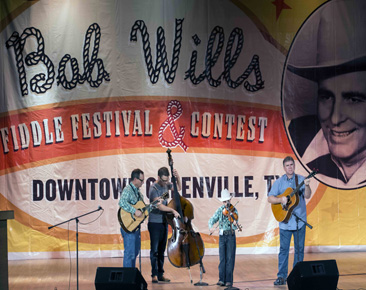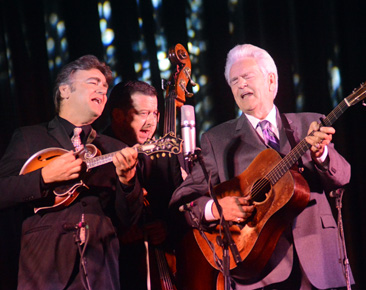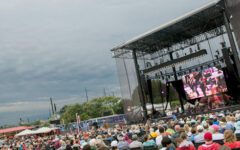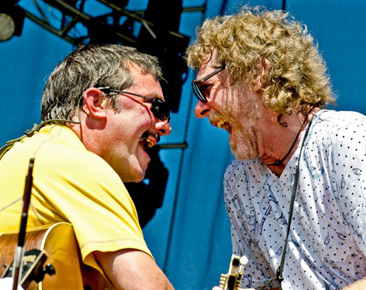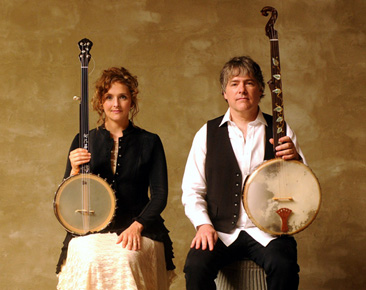
This set of reflections on a Béla Fleck/Abigail Washburn concert is a first contribution from Jen Hughes, a new writer we hope to feature semi-regularly at Bluegrass Today.
 Perfectionism
Perfectionism
I have always thought Béla Fleck is a perfectionist. I came to this notion not only by witnessing time and again the meticulous presentation of his talent, but also by fundamental truths: flawless playing of Bach on the banjo, composing each musician’s piece for a banjo concerto that resulted in a sound as seamless, beautiful and enchanting as The Imposter, and penning and playing Big Country, a song that makes you cry and your heart enlarge at just how perfect it is. I have seen a grimace from time to time over a rare misstep on stage. I imagine a personal vow to push harder to never allow such a slight imperfection to happen again (even though just about nobody in the audience noticed it). A perfectionist. Fine. Actually, thank you. This, in fact, has been one of the many things I admire about Mr. Fleck. The man has high standards. And, no doubt, he lives up to them.
Which is why I think it was such a pleasant experience in Frederick on October 25, 2014, at the regal Weinberg Center to see Béla Fleck in a little different light: almost as a human like the rest of us. Was he the same banjo-playing wizard that we have all grown to love? Yes, but there was something about this performance with his wife, Abigail Washburn, on their duo tour that conveyed that he was comfortable letting things go with the flow and having some down-home fun. At times, it seemed like we were at a house concert or in their own living room. It was intimate; comfortable – where he was just playing tunes with his ever-so-talented wife before friends (though more than a thousand of us) in the room.
Fleck was the recipient of his wife’s playful barbs. He bared vulnerabilities when Abigail failed to join him in time to sing a lyric, which the audience later learned with delight (sorry, Béla) that that was his worst nightmare. And, in an unexpected and awesome twist, he improvised a solo performance of Bonnie and Slyde, which was a fantastic treat for the audience. In response to a bellowing audience member’s request in the first part of the show, Fleck came out in the second half ready to give Bonnie and Slyde a try. Only, he had no slide. Instead, he used a table knife. How great it was to watch him give the old Flecktones tune a whirl, wincing at the odd screeches from the knife on the strings and laughing along with the audience until the utensil hit the floor. He broke into Foggy Mountain Breakdown to applause and wide grins.
Improvisation. Giving it a try. Going with the flow. Things going wrong. Execution of a song by Béla Fleck filled with imperfections. Unheard of. But, perfect. Absolutely perfect.
If genre-hopper is an actual phrase, some would apply it to Béla Fleck. He plays bluegrass, classical, African, jazz, funk, alt-rock, Celtic, and pretty much any category of music that exists. However, Fleck does not genre hop. No. He jumps in and stays. He figures it out. And, then, adds to it through that genius knack he has. He masterfully hears where the banjo fits and inserts it into the song, whatever the genre, ever so gracefully and powerfully.
That is what I witnessed at the Frederick show of the Béla Fleck/Abigail Washburn performance. The show is primarily old-timey as evidenced by the featuring of Abigail’s clawhammer banjo playing and striking voice. Old time folk. It is Washburn’s genre. And, she does it well. Really well. But, Fleck, as usual, pushes the boundaries of the genre in which he finds himself, experimenting on where the banjo, in this case his style of banjo, fits in. The results are stunning.
Fleck expertly drives the low rhythm of doom for Pretty Polly, and emits the certain frantic fear of the pursued in Shotgun Blues. But, also, just listen to his accompaniment on the Chinese folk song (translated as something like: The Sun is Out and We are Happy) as Abigail belts out the lyrics. Phenomenal. How do you think of that and then lay it down? And, with such precision? Also, on Ride to You, where Washburn’s haunting vocals are enough to sustain the heartache emotion of the tune, add Fleck plucking and pinging on the tiny uke banjo to underscore the yearning feel, and the song enters a wonderful new plane.
The boundaries are pushed – with Abigail masterfully anchoring the tradition and Fleck driving it forward. Together, it is old-timey 2014 edition. And, it is good!
 Live is Better, But You Need the Album
Live is Better, But You Need the Album
The more you listen to the new album, Béla Fleck and Abigail Washburn, the more you catch on to what exactly it is. Each listen makes it harder to fathom that the songs are played by a mere two people, each with one banjo. That is it. It is astounding to listen to. It is even more astounding to see the songs performed live.
To start, there are eight banjos on stage. The sight is enough to make you salivate. They run the spectrum from the untouchable-but-to-one Mastertone flathead Style 75 to the exquisitely designed fretless one to the cello banjo to the stalwart baritone and the cute little uke. Live, you can watch these beauties being played right before your very eyes.
At the show, you can also watch the fingers fly Scruggs style and the clawhammer ever so mysteriously claw. You can also marvel in person at how Abigail can sing and hold that one note for so long. If you have heard the song, you know which one. In person, you find yourself wanting to breathe for her.
One thing live that you just cannot get from just the album is what exactly these two are doing with the banjos to create the sounds that emerge. It was especially fun for me to witness the banjos being used for percussion. Shotgun Blues is replete with intense drumming on the head of the banjo by Abigail and even the strings and rim when it comes to Béla. My personal favorite, however, is the whoozt, whoozt, whoozt that Béla creates by sliding down the neck of his banjo in Little Birdie. Just an awesome sound that rings out danger for the poor little birdie that flew so soon. Live, you can see these tricks which you would just never know about from solely listening to the album.
Finally, at the performance, you are part of the shared experience of the beauty of it all, which is maintained throughout the entire concert, but particularly took hold during their rendition of And Am I Born to Die. Fleck and Washburn made a point to play this song from the side of the stage, a literal and figurative way to make it stand out from the rest. Fitting as they graciously dedicated it to the greats who have gone before, including Earl Scruggs, Doc Watson and Hazel Dickens. Fleck’s divine accompaniment to Washburn’s pure voice is nothing short of heavenly on this one. What a warm feeling for an audience member to be a part of this touching homage to those who paved the way to make Fleck and Washburn possible in the first place.
In the end, my advice is: go see a show. If you are a Fleck fan, if you are a Washburn fan, if you are a music fan: go see a show.
Then buy the album so you can continue to smile long after the show is over at the magic the two have created.


